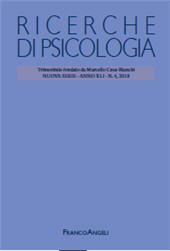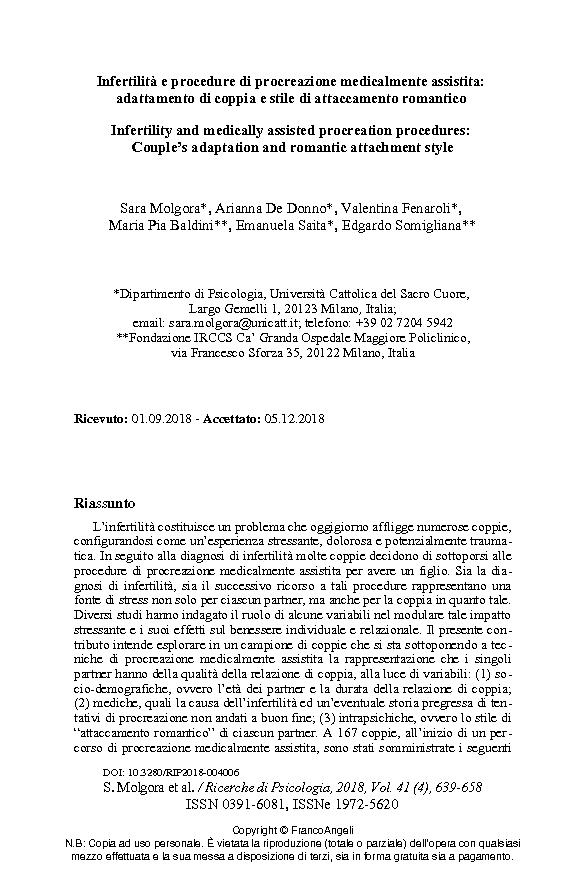Infertilità e procedure di procreazione medicalmente assistita : adattamento di coppia e stile di attaccamento romantico
639-658 p.
L'infertilità costituisce un problema che oggigiorno affligge numerose coppie, configurandosi come un'esperienza stressante, dolorosa e potenzialmente traumatica. In seguito alla diagnosi di infertilità molte coppie decidono di sottoporsi alle procedure di procreazione medicalmente assistita per avere un figlio. Sia la diagnosi di infertilità, sia il successivo ricorso a tali procedure rappresentano una fonte di stress non solo per ciascun partner, ma anche per la coppia in quanto tale. Diversi studi hanno indagato il ruolo di alcune variabili nel modulare tale impatto stressante e i suoi effetti sul benessere individuale e relazionale. Il presente contributo intende esplorare in un campione di coppie che si sta sottoponendo a tecniche di procreazione medicalmente assistita la rappresentazione che i singoli partner hanno della qualità della relazione di coppia, alla luce di variabili: (1) socio-demografiche, ovvero l'età dei partner e la durata della relazione di coppia; (2) mediche,
quali la causa dell'infertilità ed un'eventuale storia pregressa di tentativi di procreazione non andati a buon fine; (3) intrapsichiche, ovvero lo stile di "attaccamento romantico" di ciascun partner. A 167 coppie, all'inizio di un percorso di procreazione medicalmente assistita, sono stati somministrate i seguenti strumenti: Dyadic Adjustment Scale; Experience in Close Relationship Questionnaire; scheda per la raccolta di dati socio-anagrafici e informazioni mediche. I risultati indicano che né le variabili socio-anagrafiche (età dei partner e durata della relazione), né le variabili mediche (diagnosi, numero dei tentativi e tipologia di trattamento) sembrano avere alcun effetto sull'adattamento di coppia, sia nel campione delle donne che in quello degli uomini. Di contro, emerge un effetto significativo dell'ansia di abbandono e dell'evitamento sull'adattamento di coppia nelle donne, mentre solo dell'evitamento sull'adattamento di coppia negli uomini.
Tali risultati mostrano la presenza di differenze di genere, connesse con le specifiche modalità di vivere ed affrontare l'esperienza dell'infertilità negli uomini e nelle donne. Inoltre, mettono in luce come la coppia sembra in questa fase specifica configurarsi come un contenitore di alcune fatiche che risultano essere più di natura individuale, interrogando clinici ed operatori sociali sul tipo di intervento psicologico più adatto in questa delicata fase. [Testo dell'editore].
Infertility is a problem that affects many couples nowadays, representing a stressful, painful, and potentially traumatic experience. After receiving a diagno-sis of infertility, many couples decide to undergo medically assisted reproduction procedures in order to have a child. Both the infertility diagnosis and the subsequent recourse to such procedures represent a source of stress not only for each partner, but also for the couple as such. Different studies have investigated the role of some variables in modulating the impact of this stress and its effects on individual and relational well-being. The purpose of the present contribution is to explore, in a sample of couples undergoing medically assisted reproduction technologies, the representation that the individual partners have of the quality of the couple relation in light of several variables: (1) socio-demographic, i.e., the partners' age and the duration of the couple relation; (2) medical,
such as the cause of infertility and a possible prior history of unsuccessful attempts to conceive; (3) intrapsychic, i.e., the "romantic attachment" style of each partner. The following instruments were administered to 167 couples at the start of a course of medical-ly assisted reproductive treatments: Dyadic Adjustment Scale; Experience in Close Relationship Questionnaire; a form to collect socio-demographic data and medical information. The results indicate that neither the socio-demographic variables (partners' age and relationship duration), nor the medical variables (diagnosis, number of attempts and treatment typology) seem to have any effect on couple satisfaction, in both the samples of the women and of the men. In contrast, a significant effect on couple adjustment emerges for abandonment anxiety and avoidance in the women while only an effect for avoidance on couple adjustment emerges in the men.
These results reveal gender differences connected to the specific modalities of living through and coping with the experience of infertility in men and women. Moreover, they shed light on how in this specific phase the couple seems to function as a container for some of the struggles that turn out to be more individual in nature, challenging clinicians and social workers regarding the type of psychological intervention that is most suitable to this delicate phase. [Publisher's text].
Is part of
Ricerche di psicologia : 4, 2018-
Articles from the same issue (available individually)
-
Information
ISSN: 1972-5620
DISCIPLINES
KEYWORDS
- Infertilità, procreazione medicalmente assistita, adattamento di coppia, stile di attaccamento romantico



